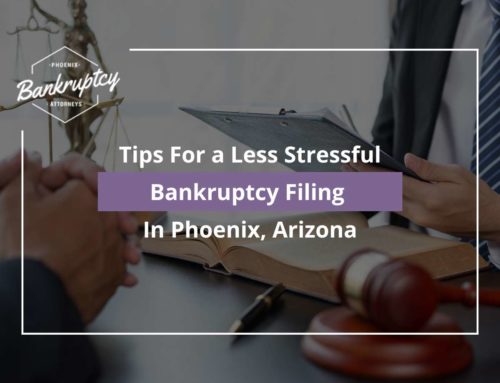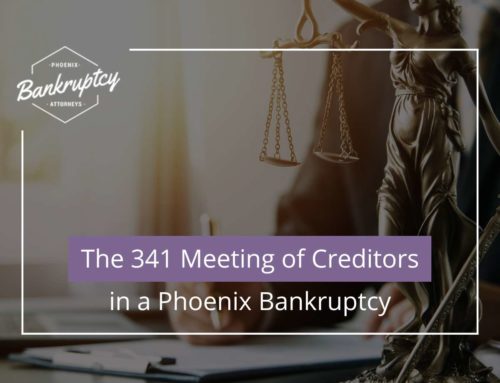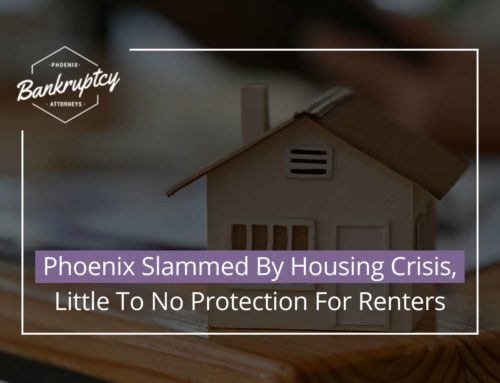Does Bankruptcy Clear Tax Debt?
Owing money to the IRS is a situation that no one wants to be in. If you find yourself owing significant tax debts, you may be considering bankruptcy as a solution to your financial problems. If so, it’s important to understand whether your tax debts can be discharged in bankruptcy, and which chapter you should file. Thus, if you have additional questions after reading the following, don’t hesitate to schedule your free consultation with one of our Phoenix debt relief attorneys.

Taxes In a Chapter 7 Bankruptcy
Chapter 7 bankruptcy clears away unsecured debts in a relatively simple, 4-6 month process. Because of the immense benefits that Chapter 7 bankruptcy provides, there are strict eligibility requirements. There are mandatory waiting periods, and limits to how much equity the debtor can hold in assets called “exemptions.” There are also strict income limits to qualify for Chapter 7 bankruptcy. The first way to qualify is by making less than your state’s median income. In Arizona, the current median monthly income for a household of one is $4,653.25. For a family of two, this increases to $5,831.25. This increases to $6,296.67, $7,142.83, $7,892.83, and so on, for each additional family member. Your income will be combined with your spouse’s and averaged over the past 6 months for bankruptcy qualification purposes.
If your income exceeds the state median income, you may still qualify for Chapter 7 bankruptcy using your disposable monthly income. If your disposable monthly income is negative, or falls within a certain threshold, you can still file Chapter 7. You must first find your average monthly income, based on the past 6 months, to determine disposable monthly income. Next, deduct certain mandatory expenses, like taxes, child support, student loans, etc. If the number you are left with meets your state’s requirements, you will be eligible for Chapter 7 bankruptcy.
Tax debts must meet a few requirements to be dischargeable in Chapter 7 bankruptcy. The tax debt must be at least 3 years old. Secondly, the tax returns must have been filed at least 2 years prior. Third, the debt must have been assessed at least 240 days prior. They must also be income tax debts that weren’t fraudulent.
Taxes In a Chapter 13 Bankruptcy
Chapter 13 bankruptcy reorganizes debts into a payment plan. For those who make more than their state’s median income, the payment plan will last 5 years. For those who make less, the payment plan lasts 3 years. That payment plan will pay off debts, in order, based on four categories. The first debts paid in a Chapter 13 plan are your legal fees relating to the bankruptcy, such as fees to your trustee and attorney. The second category paid in a Chapter 13 plan is secured debt. Most assets that serve as collateral for a loan must be paid off in full in the plan, but there is an exception for home mortgages.
The third category of debt in Chapter 13 is priority debt. These debts are generally unsecured, but can’t be discharged in Chapter 7 bankruptcy. Tax debts that don’t meet the requirements for discharge in Chapter 7 as described above will be paid in this category in a Chapter 13 bankruptcy.
The fourth and final debt category in Chapter 13 bankruptcy is unsecured debt. If the debtor has sufficient disposable monthly income to pay all the first three categories of debt in their payment plan, but only some fourth category, the bankruptcy can proceed. Unsecured debts can be discharged with only partial repayment in a Chapter 13 bankruptcy. Common examples of unsecured debts include credit cards, medical bills, and personal loans. Tax debts that meet the dischargeability requirements for Chapter 7 will also be included in the fourth category for Chapter 13 payment plans.
Benefits Of Filing Bankruptcy When It Comes To Tax Debt
If you owe money to the IRS, bankruptcy likely isn’t the only possible solution to your debt issue. You may be able to settle your debts with the IRS for a lower sum through an Offer in Compromise. Or, simply arranging a payment plan could help you avoid negative credit repercussions and pay off the debt in a timeframe that is manageable for you. However, using bankruptcy to address your tax debts can come with additional benefits.
Often, our clients’ debts come from a variety of sources. That means we rarely have someone come to us with solely tax debts, with no accompanying credit cards, medical bills, etc. If you have other debts that are dischargeable, bankruptcy will kill multiple birds with one stone.
The moment your bankruptcy petition is filed, a legal mechanism known as the “automatic stay” goes into place. When the automatic stay is active, your creditors can’t repossess your vehicle, foreclose on your home, shut off your utilities, garnish your wages, levy your bank account, and more. Generally, the automatic stay lasts until your case is discharged or dismissed. Months or years of comprehensive protection from your creditors is a vital benefit that bankruptcy provides.
When Can You Discharge Tax Debt In An Arizona Bankruptcy Filing?
The basic requirements for tax debt dischargeability are described in the Chapter 7 section above. Tax debts generally must be three years old to be discharged in bankruptcy, along with other requirements. They also must be filed for 2 years, assessed for 240 days, and not be fraudulent. If you are considering bankruptcy, it is vital that you catch up and become current on all tax filings, so that your bankruptcy can be as effective as possible.
Can I File Bankruptcy On IRS Debt?
While you usually must wait for tax debts to be dischargeable in bankruptcy, it is actually possible to wait too long. Eventually, the IRS may record a lien on your property for unpaid tax debts. Chapter 7 bankruptcy will wipe out your legal obligation to pay a debt, but can’t clear a recorded lien. Once the IRS has recorded a lien on your property, the property can’t be sold or transferred- a Chapter 13 bankruptcy may be a better solution for your tax debts. The lien will be paid along with your secured debts (third category) in a Chapter 13 payment plan.
Facing Tax Debt? Need Debt Relief? Contact Our Phoenix Bankruptcy Lawyers
For those facing tax debts, in addition to several other types of debts, bankruptcy can be a powerful way to get your finances back on track. Depending on your situation, you may qualify for Chapter 7, Chapter 13, or even both. Navigating the decision to file bankruptcy, which chapter, and when, can be complex and stressful. Hiring the right Phoenix bankruptcy attorney to represent you will make it easier.
With bankruptcy on the horizon, it can be difficult to afford the fees many attorneys require up front before your case can be filed. That’s why our Arizona debt attorneys offer competitive rates, free consultations, and payment plans starting as low as ZERO DOLLARS DOWN. Find out more about our $0 down bankruptcy filing in Phoenix, Arizona.
You don’t need to sacrifice quality for this kind of affordability, either. Our Arizona debt relief lawyers have years of experience guiding clients just like you through their financial struggles as quickly and painlessly as possible. Also, we can help you file an emergency bankruptcy or a medical bankruptcy. To learn more about the benefits of filing bankruptcy with our firm, call or use our online form to schedule your free consultation today.
PHOENIX BANKRUPTCY ATTORNEYS





